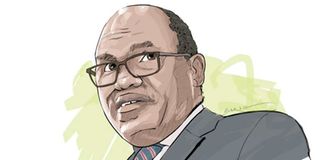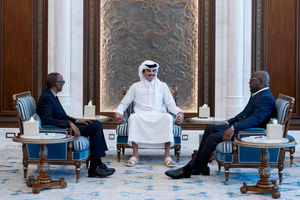Hero or villain? Wafula Chebukati divides opinion, two disputed presidential polls later

When she resigned from her post as a commissioner of the electoral body in 2017, Roselyn Akombe described her then-boss Wafula Chebukati as a man under siege.
Fast forward to 2022, and the Independent Electoral and Boundaries Commission (IEBC) chairman finds himself in a similar predicament.
At Bomas of Kenya, when he announced the presidential results of the August 9 polls, he had been abandoned by the majority of his team.
Yet again, he cut a solitary image as he announced William Ruto as the President-elect after garnering more votes than his rival Raila Odinga.
Four commissioners Juliana Cherera (vice-chairperson), Francis Wanderi, Justus Nyang’aya, and Irene Masit rejected the declaration made by Mr Chebukati, citing a lack of transparency.
But Mr Chebukati stood by the results, saying the constitutional mandate of making the declaration falls squarely on him as the chairman of the commission.
“The Commission shall have an opportunity to respond and demonstrate in further detail the circumstances under which the election was conducted, results verified and outcome declared following the constitution and the law,” he said.
“The role of national returning officer for the presidential election is not a shared responsibility and not subject to plenary decisions of the commission. All returning officers including the national returning officer for presidential election took an individual oath of secrecy before embarking on their duties.”
Mr Chebukati took office in January 2017, seven months before the General Election. His team's appointment was greeted with hope after their predecessors resigned from the commission after months of protest, as the opposition expressed a lack of confidence in them.
Two disputed presidential elections later, Mr Chebukati and the IEBC he leads continue to divide opionion depending on which political side one belongs to. To some, Mr Chebukati is a hero who steered a wavering ship with resoluteness and calm. To others, he is a villain who has bungled two elections.
Mr Chebukati has also found himself in the spotlight for overseeing some of the most expensive elections in Africa.
The 61-year-old once admitted Kenya runs the most expensive election in the region, but his efforts to bring down the cost have borne no fruits.
“The country runs certainly the most expensive election in the region and arguably one of the most expensive globally. The commission [IEBC] is focused on driving down the cost drivers and ensuring that the burden of overly expensive elections is managed,” he said in 2018, in a post-election evaluation forum.
Part of their strategy to tame the high cost of elections, Mr Chebukati said, was “to re-use materials and equipment and early procurement of goods and services.”
From the Sh42.57 billion allocation from Treasury a few months ago, a substantial part catered for the General Election activities and materials, with mass voter registration costing taxpayers Sh2.56 billion.
Training of polling officials was to cost Sh2.5 billion, while voter education and verification took a sizable share. The commission was to spend Sh424.6 million on the nomination and candidate registration, and Sh255 million on diaspora voter registration.
The previous elections were no different. In 2017, the commission under Mr Chebukati, requested for Sh46.2 billion.
“The commission also received a further pledge of Sh1.42 billion for financial years 2016/2017 and 2017/2018 from development partners. Out of the total budget, Sh5.5 billion can be classified as a capital investment on the purchase of various technological gadgets and equipment,” he said.
Besides the failure to tame the high elections expenses, his reign set to end in five months has been marred by allegations of vote rigging and internal wrangles.
Willy Mutunga, the former chief justice once said, “In Africa, there is a widening chasm between voting and counting — an irony of literacy where peasants (most voters) know how to peacefully cast their ballots during the day, but graduates and computers (presiding and returning officers) forget how to count on election night.
There is urgency in changing this perception and/or reality and reclaim and reaffirm public faith in electoral politics. The IEBC has an oversized role in this regard, but only if it conducts itself competently, credibly, and fairly.”
Before joining the commission, Mr Chebukati was been running, Wanyonyi & Company Advocates, a law firm he founded in 1986, a year after he graduated from law school. He later partnered with another law firm to form Cootow & Associates.
The firm specialised in maritime, shipping, company, aviation, insurance, international trade, intellectual property, mining, environmental, and labour law.
An alumnus of Lenana School, Mr Chebukati graduated from the University of Nairobi in 1985. Most of his classmates are pominent people in legal practice, including former director of the Ethics and Anti-Corruption Commission PLO Lumumba, and senior counsel Philip Murgor.
An ardent golfer, Mr Chebukati is a member of several local clubs. He is a member of the Kenya Golfing Society and previously served as the captain and chairman of both Mombasa and Nyali Golf clubs and a committee member of the Kenya Golf union.
The man who was born in Bokoli village in Bungoma County holds an MBA degree from Jomo Kenyatta University of Agriculture and Technology.
The question many are asking is whether the planned presidential election petition will leave the commission more divided than ever or Mr Chebukati might convince the disgruntled commissioners back to the fold. Or will his reign cost taxpayers more billions of shillings?
This story was first published by theBusiness Daily





